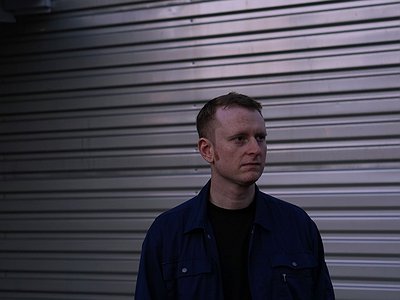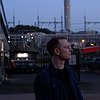Could you describe your creative process on the basis of a piece or album that's particularly dear to you, please? Where did the ideas come from, how were they transformed in your mind, what did you start with and how do you refine these beginnings into the finished work of art?
Last year I made an interactive audio-visual installation, ‘Orphan Works’, as a result of me wanting to investigate older technologies and repurpose them to create something that they weren’t originally meant for. It was built by modifying an abandoned computer game engine from 1996. I’m not particularly interested in ‘retro’ expressions per se, but rather exploring what qualities older technologies are capable of in terms of emotive expression that newer aren’t. For instance, low-res textures in older games are great at evoking ambiguity, which allows for the beholder to interpret them in a creative way by intuitively filling in the blanks. This is lost with the technological leap of precise photorealism in 3D-graphics. Some other examples of similar phenomena are expressions that come out of certain synthesis techniques or scarce sample memory for audio.
In a few intense weeks of finishing the installation, the virtual game world sort of ended up being a fictional manifestation of my home city Stockholm, where my own fractured images of what it could have been, what it could have become and what it could be, existed simultaneously. The sound material was specific for each location in the game world, but the resulting music was generative and controlled by whoever was interacting with the installation.
My upcoming record ‘Magelungsverket’ is derived from this installation, a collection of the sound materials from those fictional locations, but re-imagined as fixed, orchestrated pieces. One of the hopes is that they, when detached from the virtual game world, could be interpreted in an emotive, imaginative was by whoever is listening. I often find this type of ambiguous expression, that is possible with music, more interesting to explore than precision or ‘emotional fidelity’ or whatever you wanna call it.
There are many descriptions of the ideal state of mind for being creative. What is it like for you? What supports this ideal state of mind and what are distractions? Are there strategies to enter into this state more easily?
I don’t have an ideal state of mind. It’s always different - focused, strained, depressed, excited, hungover etc. I just have to work anyways and eventually something will come out - it’s not fun. I usually do a lot of stuff in periods and then come back to it later to evaluate. I think this is why I’ve come to rely on problem-solving as a part of process - it becomes more pragmatic as opposed to hoping for a stroke of inspirational luck from god knows where.
How is playing live and writing music in the studio connected? What do you achieve and draw from each experience personally? How do you see the relationship between improvisation and composition in this regard?
I think it’s easier to let processes take time when playing live, especially when working with long durations. Also I tend to take things more to the extreme in live situations. This is harder when working by yourself in a studio setting. If I play some material live that I don’t know how it should be structured, it can suddenly become quite clear during or after a performance. I always seem to do that after said material is released though … haha.
How do you see the relationship between the 'sound' aspects of music and the 'composition' aspects? How do you work with sound and timbre to meet certain production ideas and in which way can certain sounds already take on compositional qualities?
They’re intertwined for me personally. Sound can to me encompass emotion, narrative and also depending on mood, different perceptions of time, which all can inspire compositional ideas. This works the other way around as well.
Our sense of hearing shares intriguing connections to other senses. From your experience, what are some of the most inspiring overlaps between different senses - and what do they tell us about the way our senses work? What happens to sound at its outermost borders?
At the moment, memory and temporal perception are interesting to me in regards to sound. Sound objects or entire compositions, or silence for that matter, can be perceived in vastly different ways temporally depending on a variety of factors. Sound and how it’s organised have the ability to distort perception as well.
Recently I did some research on compositional and synthesis techniques used in early video games, for instance how samples were structured for the SPC700 sound chip (made for the Super NES). It had very limited memory, so it could only load very few, short samples simultaneously, but they could be arranged in a multitude of ways by changing speed and placement in time - basically modifications in the temporal domain. The same sample could be played at a very slow speed creating a background ambience, while being arranged in other speeds to build the musical soundtrack. Entire compositions and sound environments would be built using only one short sample at different speeds, changing the perception of its content in each iteration.
This is done in other sample-based music as well, but in an interactive, non-linear medium it suddenly feels like it’s possible to dissolve the temporality of a 0.1-second sample, with all of the chaos engrained into it at the time of recording being presented repeatedly and stripped of its source and context, in differing temporal realms. This technique was kind of genre-defining for a certain type of sound work for games, which can be heard on later platforms even though they lacked these technical limitations, for instance Akira Yamaoka’s more experimental work for the Silent Hill-series.
Speaking of acousmatic listening, to be using the Schaeffarian term, it also struck me that early game music often tried to mimic acoustic music, like orchestral scores or rock bands. But with the technical limitations of the time, all those pulse waves and short samples could really do was to substitute as symbols for their real-world counterparts. This was probably apparent to adults at the time, but as a kid growing up alongside the technological development of digital sound capabilities and lacking the cultural context, they were sounds just as any other, and still are. I hear them as they sound and not what they are supposed to represent or what their source is. They aren’t nostalgia, they are real.
These kind of meta-narratives that are passed on in the memory of sound and art are interesting to me, as they can evoke subtle emotions that can’t possibly be described with words. To allude to your first question, this is probably what’s always drawn me towards sound and music.
Art can be a purpose in its own right, but it can also directly feed back into everyday life, take on a social and political role and lead to more engagement. Can you describe your approach to art and being an artist?
‘Being an artist’ or composer for that matter is kind of a new concept to me. Before studying music, I saw myself as a part-time musician, even though I guess I also wrote music. I also have never supported myself economically entirely through music. Depending on the context, I believe anything can be political, but I don’t think art has to be created with that purpose in mind.
It is remarkable, in a way, that we have arrived in the 21st century with the basic concept of music still intact. Do you have a vision of music, an idea of what music could be beyond its current form?
I don’t know, at the moment most of those visions are depressing. I’d like for music (and art, and the internet) to be free of predatory market interests that seek to ‘monetize’ - or whatever they wanna call it - everything, killing diversity of expression, practices and rituals, and enforcing harmful power structures in both local and digital music communities. I’d also like for not all emphasis to be put in the idea of democratisation through technology, that tools for creating music being more easily accessible than before will lead to a future where ‘anyone can make music’. This in my opinion is a kind of magical thinking, as if said technology just works and assembles automatically, streamlining our lives and saving us time, while really it’s just a matter of time (and resources) being redistributed globally from people who work long hours to maintain the technology to people who utilise the technology.
In concoction with tech innovation I’d like to see a resurgence of economic models that allow people the actual time and support to discover and practice music, it could be support for local music community activities or models for publicly funded municipal music and arts schools, like we have in Sweden (but sadly in recent years have been partly defunded and exclude people of lesser means).



